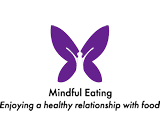What Is Mindful Eating?
 Mindful eating is about being fully present with the food you’re eating in any given moment. It’s about noticing your food, savouring the flavour and paying attention to the eating process in terms of your body’s signals, such as whether you’re actually enjoying the food, whether you actually need to be eating and when you’ve had enough to eat. It’s not the case that overeating equates to enjoyment; overeating is usually a reflection of mindless eating (not paying attention to what, how, and how much you’re eating), or a reflection of emotional eating. The aim of mindful eating is to enjoy less food more. This doesn’t mean less in terms of restricted amounts, but less in terms of eating in tune with your body’s needs. Unfortunately portions sizes have increase over the decades, and we’ve got used to eating larger portions. Many people say they can’t leave food on their plate, which often stems from childhood, where parents might have told you that you wouldn’t get any pudding if you didn’t finish your meal- this may have caused people to lose touch with their body’s signals, and as adults they now feel they can only stop eating when the plate is empty, not when they’ve had enough to eat.
Mindful eating is about being fully present with the food you’re eating in any given moment. It’s about noticing your food, savouring the flavour and paying attention to the eating process in terms of your body’s signals, such as whether you’re actually enjoying the food, whether you actually need to be eating and when you’ve had enough to eat. It’s not the case that overeating equates to enjoyment; overeating is usually a reflection of mindless eating (not paying attention to what, how, and how much you’re eating), or a reflection of emotional eating. The aim of mindful eating is to enjoy less food more. This doesn’t mean less in terms of restricted amounts, but less in terms of eating in tune with your body’s needs. Unfortunately portions sizes have increase over the decades, and we’ve got used to eating larger portions. Many people say they can’t leave food on their plate, which often stems from childhood, where parents might have told you that you wouldn’t get any pudding if you didn’t finish your meal- this may have caused people to lose touch with their body’s signals, and as adults they now feel they can only stop eating when the plate is empty, not when they’ve had enough to eat.
No ‘Good’ Or ‘Bad’ Foods
 Mindful eating is about having better quality eating experiences, feeling relaxed around food, not feeling that food is the enemy- food shouldn’t be a battle ground; it’s there to be enjoyed, and it shouldn’t cause angst and guilt. It’s also about giving yourself choice and permission. No one food is ‘bad’, it’s how often you eat that food and how much of it you eat that counts. For people who have a long history of following weight loss diet plans, their ‘diet head’ tells them that foods are either ‘good’ or ‘bad’ or ‘allowed’ or ‘forbidden’; and yet, if we deny ourselves the foods we love, we only end up wanting them more. This is why learning the skill of ‘middle-way’ eating is far better than swinging between extremes of ‘good’ eating and ‘bad’ eating, and more sustainable long-term. The black and white mindset is very common, causing us to swing between abstaining from certain foods or completely overeating them, and nowhere in between. An example is either eating a whole packet of biscuits, no biscuits, or allowing yourself to truly enjoy one or two biscuits guilt-free. And it’s not about eating any biscuit, but a biscuit you really enjoy.
Mindful eating is about having better quality eating experiences, feeling relaxed around food, not feeling that food is the enemy- food shouldn’t be a battle ground; it’s there to be enjoyed, and it shouldn’t cause angst and guilt. It’s also about giving yourself choice and permission. No one food is ‘bad’, it’s how often you eat that food and how much of it you eat that counts. For people who have a long history of following weight loss diet plans, their ‘diet head’ tells them that foods are either ‘good’ or ‘bad’ or ‘allowed’ or ‘forbidden’; and yet, if we deny ourselves the foods we love, we only end up wanting them more. This is why learning the skill of ‘middle-way’ eating is far better than swinging between extremes of ‘good’ eating and ‘bad’ eating, and more sustainable long-term. The black and white mindset is very common, causing us to swing between abstaining from certain foods or completely overeating them, and nowhere in between. An example is either eating a whole packet of biscuits, no biscuits, or allowing yourself to truly enjoy one or two biscuits guilt-free. And it’s not about eating any biscuit, but a biscuit you really enjoy.
More Satisfying Eating Experiences
The more we chew, the more the brain registers that food is being eaten, and we’ve got a better chance of feeling more satisfied after a meal or snack. This is why fast eating is often linked to overeating, particularly if it’s mindless too, which usually happens when we’re distracted, ie doing something else at the same time as eating, or when we’re eating for emotional reasons, such as feeling upset, stressed or bored.
Self-Care: Addressing What You Need
 Mindful eating is also about connecting head and body- whilst we need to engage the brain more, when it comes to making food choices that are in our own best interest, we also need to give the body a chance- maybe it’s asking for another kind of food than the one you choose out of habit, or maybe the body doesn’t want food at all- maybe you need something else at that moment. This is why self-care is a key part of mindful eating and mindfulness. A good question to ask yourself is: “What do I need right now, other than food?” Maybe it’s a nap, or a hug, or you might be in need of a relaxing activity, or maybe you need to go and enjoy an energising or stimulating activity.
Mindful eating is also about connecting head and body- whilst we need to engage the brain more, when it comes to making food choices that are in our own best interest, we also need to give the body a chance- maybe it’s asking for another kind of food than the one you choose out of habit, or maybe the body doesn’t want food at all- maybe you need something else at that moment. This is why self-care is a key part of mindful eating and mindfulness. A good question to ask yourself is: “What do I need right now, other than food?” Maybe it’s a nap, or a hug, or you might be in need of a relaxing activity, or maybe you need to go and enjoy an energising or stimulating activity.
Realistic, Not Perfect Eating
Try to avoid allowing the majority of your food choices to be purely taste-bud driven, and consider your nutritional needs too. Think 80/20- mindful eating isn’t about perfect eating, but it’s about factoring in both taste (enjoyment) and nutrition most of the time. We all eat mindlessly from time to time and we can also end up eating delicious foods that have no nutritional content, and that’s ok, if it’s occasional.
Thinking Before Eating
A great way to engage the brain is to pause- consider your food options and take some time to think about what, and whether to eat. If you don’t really feel like food in that moment, then pass on it- you can always go back and have it later. There will always be external triggers to eat (such as the sight and smell of food), but by slowing down and thinking first, we can make much more mindful food choices, and can end up feeling a lot better for it too.
Getting Curious About Your Eating In A Non-Judgemental Way
Mindfulness as a concept in itself is about getting curious in a non-judgemental way- making observations and responding accordingly. Many people describe themselves as having a bad relationship with food- they would describe themselves as emotional eaters. Guilt and shame around food choices and eating is common, and it’s a sign of a poor relationship with food. If you feel you’ve made a ‘bad’ food choice, move on, don’t let things snowball, and ask yourself how you can make a better choice at the next eating opportunity. Or maybe that food choice wasn’t so bad afterall. Our own assessment of our eating is key, as it determines how we feel and respond.
 Learning To Manage Food, Not Avoid It
Learning To Manage Food, Not Avoid It
Many people feel that in order to control their eating and food choices they need to go on a diet. But diets can be restrictive and unenjoyable, so it’s about learning to manage food. It’s also not about learning to avoid food temptation, but learning to control temptation. That way we build the skills to navigate successfully around the food environment. Importantly, we also need to explore why we might be relying on food to ‘cope’ for emotional reasons. It’s hard for a person to eat mindfully if they’re an emotional eater.
A Sense Of Choice, Not Deprivation
Adopting mindful eating practises can therefore help you to eat in a more balanced, enjoyable and nutritious way. There’s no sense of deprivation or restriction, but eating more in tune with your taste preferences and body’s needs. There’s also a sense of choice, and the knowledge that food will always be there. Becoming a more mindful eater is an act of self-care, and self-care is an important foundation on which to build a better relationship with food.
My Services
For more information about how I support clients, see ‘Services‘.
One-to-one sessions: Buy three sessions up front and get a 4th session FREE! Contact me via email.
Online talks: please click HERE for more information about talk topics. Click HERE to see the latest events schedule and to purchase tickets for any of my events via Eventbrite.
For additional tips and information see my other blogs.

